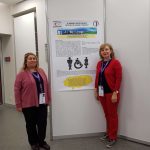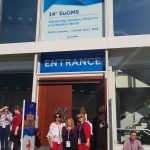
With more than 1,500 attendees from Europe and from all over the world, the 14th International Congress of the European Union Geriatric Medicine Society, which is one of the largest and most influential academic conferences and exhibitions on Geriatrics, was realized in Berlin, Germany on 10-12 October 2018.
The Dean of the Faculty of Nursing of Near East University, Professor Nurhan Bayraktar along with Deputy Dean Associate Professor Ümran Dal Yılmaz and Faculty Member Professor Özge Uzun participated in the 14th International Congress of the European Union Geriatric Medicine Society, “Advancing Geriatric Medicine in a Modern World”, with 6 poster presentations.
The Directorate of Press and Public Relations Office of Near East University released that the faculty members from the Department of Surgical Diseases Nursing of NEU Faculty of Nursing made 6 poster presentations titled "Fluid balance problems among elderly people", "Is urinary incontinence the destiny of elderly people", "Complementary and alternative medicine use by older adults in Turkey: Literature review", “Halitosis in Elderly People”, “Barriers of Mechanical Prophylaxis for Deep Vein Thrombosis Among Elderly with Hip Fracture” and “Nurses’ Awareness on Hospital Acquired Infection Risks of the Geriatric Patients”.
The Most Common Fluid and Electrolyte Balance Problem in the Elderly; Dehydration...
The poster presentation on "Fluid Balance Problems among Elderly People”, which Professor Nurhan Bayraktar and Associate Professor Ümran Dal Yılmaz prepared jointly, provides scientific data that some risk factors such as physiological changes, physiological impairments, restriction of access to fluid intake, multiple medication, incontinence and similar causes can make the elderly more vulnerable to changes in water and electrolyte balance with a resulting increase in morbidity and mortality.
Weakening of Bladder Muscles in the Elderly Causes Urinary Incontinence to Increase...
In their other poster presentation, Professor Bayraktar and Associate Professor Yılmaz discussed the issue titled "Is Incontinence the Destiny of Elderly People?" In their poster presentation they present data that incontinence in the elderly can be caused by a variety of different factors by highlighting that weakening of the bladder muscles causes an overactive bladder resulting in an increase in urinary incontinence. No matter what the amount is, urinary incontinence is defined as the loss of the voluntary control over the evacuative function of urination. By underlining that women are more prone to develop urinary incontinence, the faculty members point out that urinary incontinence is a common and often embarrassing problem in the elderly. In their presentation, they also highlight the significant role of some factors such as advanced age, cognitive impairment, genitourinary surgery, obesity, and impaired mobility in developing urinary incontinence.
The Most Common Complementary and Alternative Medicine Therapy Used by the Elderly in Turkey; Herbal Products...
Professor Özge Uzun from the Faculty of Nursing also provided contribution to the congress with a notable poster presentation on "Complementary and alternative medicine use by older adults in Turkey: Literature review". The poster presentation presents the results acquired from the literature review on the use of complementary and alternative medicine (CAM) in the elderly in Turkey. The study points out that the use of CAM varies between 54% and 59% among the elderly adults in Turkey. The study unveils the fact that the use of herbal products ranges from 55.2 to 62.1 while the use of non-herbal products varies between 43% and 53%. Despite the variety of factors affecting the use of CAM, herbal and non-herbal products, with the frequencies mentioned above, are the most common CAM therapies used by the elderly in Turkey. Dietary supplements, spiritual healing by praying, physical exercises, massage therapy, magnet therapy, acupuncture, listening to music, and meditation are among the other CAM therapies used by the elderly adults in Turkey. To help improve the overall physical and mental health, disease prevention, pain relief, improvement of overall wellbeing, to supplement the medical therapy are among the most common causes of CAM use.
The Causes of Bad Breath in the Elderly were discussed...
Tamer Yılmaz, Professor at NEU Faculty of Dentistry, and Ümran Dal Yılmaz , Associate Professor at NEU Faculty of Nursing, made a poster presentation on their joint study titled "Halitosis in Elderly People".
Barriers of Mechanical Prophylaxis for Deep Vein Thrombosis among Elderly with Hip Fracture
A significant joint study conducted by Professor Nurhan Bayraktar and Khalid Al-Mugheed, research assistant at the Faculty of Nursing, was presented at the conference and attracted great interest of the attending body. The joint study titled "Barriers of Mechanical Prophylaxis for Deep Vein Thrombosis Among Elderly with Hip Fracture" is a systematic compilation providing an overview of the literature on barriers of mechanical prophylaxis for DVT in the elderly patients with hip fractures. Pointing out that Deep Venous Thrombosis (DVT) is a common complication following lower extremity fracture surgery; the faculty members underline the effectiveness of mechanical prophylaxis in preventing deep vein thrombosis and reducing or minimizing venous congestion. In their presentation, they also highlight various obstacles affecting prophylactic measures.
Nurses Need to Raise Awareness on Hospital Acquired Infection Risks of the Geriatric Patients
The joint study conducted by Master's Degree student Ibrahim S.S. Abumettleq and Professor Nurhan Bayraktar was presented at the congress under the title "Nurses’ Awareness on Hospital Acquired Infection Risks of the Geriatric Patients". In their poster presentation, they underline that nurses need to raise their awareness regarding infection risks associated with health services and enhance their knowledge about how to prevent and eliminate the risk factors.


